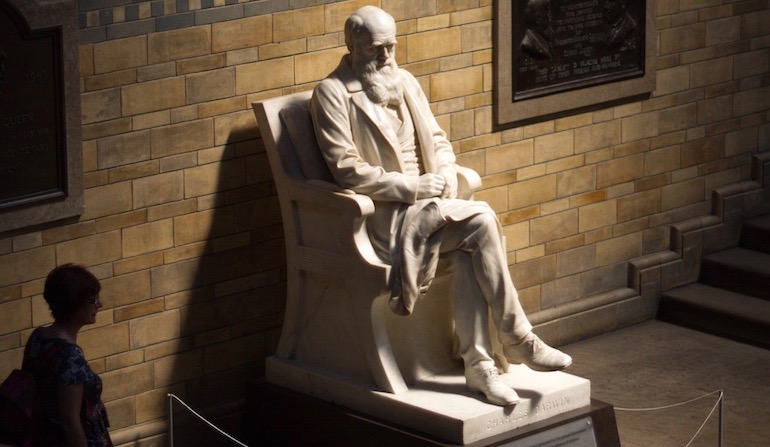 Evolution
Evolution
Sociology Journal: Why Lobbyists So Persistently Call Evolution a “Fact”


How many times have you heard the phrase “evolution is a fact”? Even some very smart people, who you might think would know better, have been gulled by the constant repetition of variations on this assertion. Sure, you’ve heard it on Friends. You’ve heard it on Cosmos. You’ve heard it so many times from so many evolution advocates that it’s almost pointless to document the ubiquity of this way of talking.
When speaking to the public, why are Darwin advocates so emphatic that “evolution is a scientific fact”? Finally, an article in a mainstream sociology journal has tackled this question. In “Evolution as a fact? A discourse analysis,” authors Jason Jean and Yixi Lu confirm what we knew all along: evolution advocates call evolution a “fact” in order to make evolution appear more certain to the public.
What We Knew All Along
You don’t have to take our word for it. Here is what the paper says:
The primary goal of those who advocate for this discourse has always been to counter antievolutionism by associating the term ‘fact’ with evolution, thereby making evolution appear more certain to the public. … [A]dvocates clearly show how the discourse is driven by concerns external to the scientific vernacular and the practice of science, namely a perceived need to make evolution appear more certain to the public.
(Jason Jean and Yixi Lu, “Evolution as a fact? A discourse analysis,” Social Studies of Science, Vol. 48(4) 615-632 (2018))
In employing this rhetoric, Darwin activists also have a secondary goal — it’s to assert their “intellectual authority” and to achieve “denial of…resources,” specifically “intellectual authority and career opportunities,” to Darwin-skeptics. What, you’re not surprised to hear that either? Here’s how the article puts it:
The discourse encompasses all instances where public scientists (Turner, 1980) describe evolution as a fact. Public scientists are those who engage in the practice of public science, where scientists or anyone claiming to speak for science address an audience in order to achieve their professional goals. These goals, according to Gieryn (1983), are the ‘acquisition of intellectual authority and career opportunities; denial of these resources to “pseudoscientists”; and protection of the autonomy of scientific research from political interference.’ (p. 781)
But there’s a problem: most scientists don’t all agree about what exactly words such as “fact,” “theory,” or “hypothesis” mean. Unless these terms are carefully defined, when evolution advocates claim evolution is a “fact,” they aren’t promoting a clear and careful understanding of any scientific idea. Instead, they perpetuate what the article calls “a discursive morass.”
“An Extremely Probable Idea”
The authors explain that “[t]he inability of advocates to agree upon how facts are defined, described and related to hypotheses and theories has led to the creation of an ever-increasing morass.” In a very well-researched passage, they list many of the “contradictory” yet rhetorically forceful labels that are applied to evolution when it is pushed on the public. These include calling evolution:
- “the truth”
- “reality”
- “a historical fact”
- “an extremely probable idea”
- “a well-substantiated hypothesis”
- “a well-substantiated theory”
- “a former theory”
- “a common-sense fact”
- “a fact, not a theory”
- “a fact and a theory”
- “a fact, theory and path”
The article argues that evolution activists thus “take traditionally ambiguous scientific terms, and define them and their relationships to one another in disputed, contradictory and confusing ways.” This “contradictory” discourse creates serious problems for the public’s understanding of science — what the article calls “vernacular confusion.” In fact, this confused way of speaking shows that evolution advocates really aren’t all that interested in carefully explaining to the public what terms like “hypothesis,” “theory,” and “fact” mean — they’re mainly interested in getting you to disbelieve Darwin-skeptics and to accept evolution:
Given these issues, it is possible to conclude that the discourse was never meant to properly explain scientific terminology to the public. Associating the term ‘fact’ with evolution is instead a means to attack antievolutionist claims and arguments, despite the negative consequences of a minority scientific terminology, ignoring established scientific consensuses, and creating a morass of contradictory and confusing explanations for how evolution is a fact. In his detailed analysis of the issues involved, the biologist Kirk Fitzhugh (2008: 112) dismisses the discourse, referring to it as a series of ‘catch phrases that promote misunderstanding.’
Ultimately the article aims to streamline the public discourse and encourage scientists who are Darwin advocates to stop abusing terms like “fact” or “theory” simply for the purpose of advocating evolution. That is a fine goal, and good luck with it. Cat-herding might be easier.
A “Criticism-Free Zone”
Improving the rhetoric of Darwin lobbyists seems to be an especially unlikely outcome since, as the authors astutely observe, these public advocates of evolution have adopted an “implicit agreement” in which they refuse to publicly criticize one-another. The paper calls this a “criticism-free zone” among Darwin advocates. Consider this striking passage:
The second implicit agreement is that no discourse advocate is allowed to subject another advocate’s cultural cartography to criticism. Among all the discourse advocates and users discussed here, none have made a single criticism of the cultural cartographies used by other advocates, and they routinely cite one another in support of their discourse advocacy (Gregory, 2008; Hughes, 1982; McComas, 1997; Moran, 2002). This agreement has assisted in the establishment of a ‘criticism-free zone’ in public science, in which discourse advocates can make seemingly any claim regarding key scientific terms.
… This criticism-free zone has thus far gone unnoticed, as discourse advocates and users reserve their attacks for antievolutionists.
“Evolution Is A Fact, Fact, FACT!”
That is very perceptive. Public advocates of evolution indeed tend to go soft on one another so as to focus their fire on Darwin-skeptics. The paper could cause a stir, since it has violated this “implicit agreement” that mainstream academics should never criticize public advocates of evolution. Because these authors have dared to tell the truth and criticize that which is otherwise beyond criticism, they may be in for some harsh responses from Darwin lobbyists.
What’s the take-home point of this paper? Well, one is that next time someone tells you “Evolution is a fact, fact, FACT!,” as Michael Ruse does in his book Darwinism Defended (p. 58), ask him what he means by “evolution,” and by “fact.” You could also remind him that people who use this kind of rhetoric are simply bullying their audience while, in the process, damaging the public’s understanding of science.
